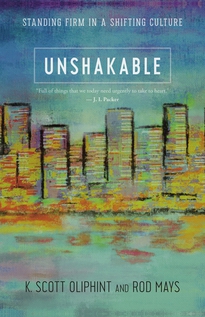Below is an excerpt taken from pages 46-47 of Unshakable: Standing Firm in a Shifting Culture by K. Scott Oliphint & Rod Mays.
LOST AT SEA?
We have all likely known people who have said, “I need some time away to try to find myself.” Perhaps we have friends who are tirelessly trying to figure out who they are. These inward journeys and explorations raise a basic question: Why is it that we don’t know who we are as we live our lives in the context of the here and now? A natural follow-up question is, how do we figure out who we are?
These questions are not peculiar to this postmodern era. Since the fall of man, people have struggled both on the horizontal (or relational) level and at the “self” level to try to find themselves. Both of these struggles take us all the way back to the garden. There we find out that we are lost, because in our sins we hope not to be found.
After Adam ate the forbidden fruit (Genesis 3), he attempted to hide—naked and ashamed. God asked Adam, “Where are you?” This question does not point to a deficiency in God’s omniscience. It is not that God did not know Adam’s and Eve’s physical location. The question was not framed for the purpose of providing information for God. The question goes to Adam’s heart and to the heart of every man and woman on earth.
Like all of us, Adam and Eve were graciously placed in God’s creation. They were responsible, under God, to live and work in God’s world according to God’s own design (see Gen. 1:28–29; 2:15–17, 19–20, 24). But Adam and Eve sinned against God, and their reaction to that sin was to attempt to hide from God (Gen. 3:8). When God came to have fellowship with them, they were hiding. And so he asked, “Where are you?” It was a question designed to highlight that even though they were still living in God’s world, they were no longer “with” God. The fellowship that God had established between himself and them had been broken. Instead of being with God, they were hoping to be separate from him.
Neither is God’s question, “Where are you?” a question of location. It is a question that points to our relationship to God. In that sense, the question, “Where are you?” is identical to the question, “Who are you?” With respect to our relationship to God, the answer to one is the answer to the other.
For centuries, expositors of the Bible have stressed the importance of the vertical, or God-to-man, relationship as the necessary basis for understanding who and where we are. Philosophers and theologians alike have often encouraged people to think about where and who they are in relation to God. In the fourth century, Augustine of Hippo confessed that because God created us for his own glory, our hearts remain restless until we find our rest in him. In the opening sentence of John Calvin’s Institutes, Calvin insightfully sets out the radical truth that true knowledge of ourselves depends first on a true knowledge of God. The mathematician and theologian Pascal wrote about the “God- shaped emptiness” within human beings. God created us to know him, to be able to stand before him naked and unashamed as Adam and Eve did before the fall. Our need to know who we are, and who he is, is a need embedded in us since creation. It cannot be excised from the created heart of man.
How, then, should we think about this need? Are there categories that can help us understand just how to think about our indelible need to know God truly and, in knowing him, to truly know ourselves?
Excerpt taken from Unshakable: Standing Firm in a Shifting Culture by K. Scott Oliphint and Rod Mays, pages 46-47, P&R Publishing, copyright 2016.


Comments